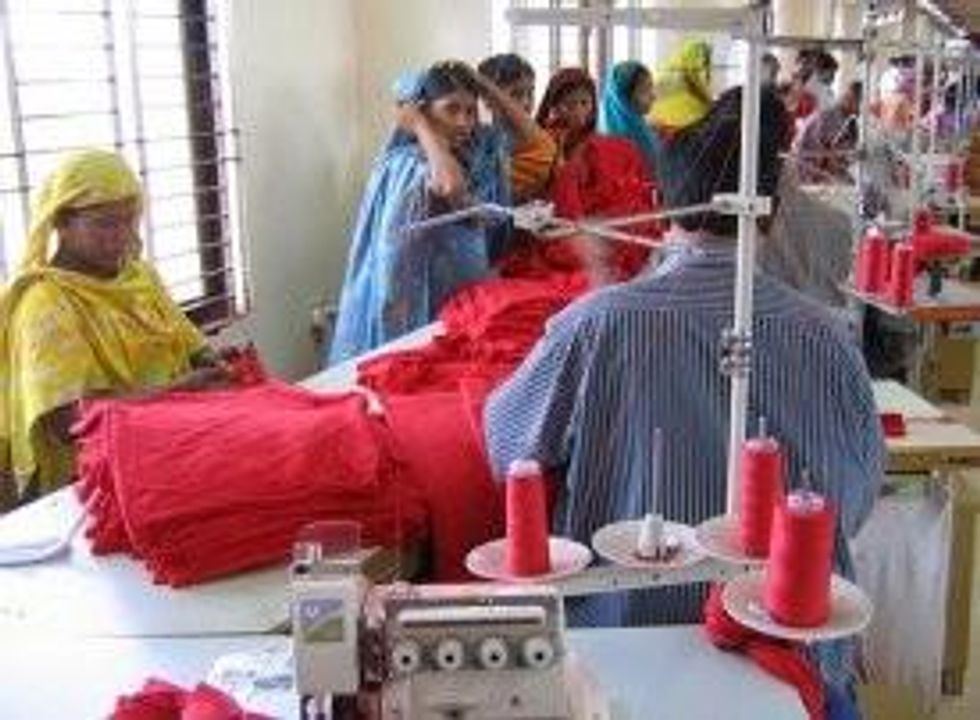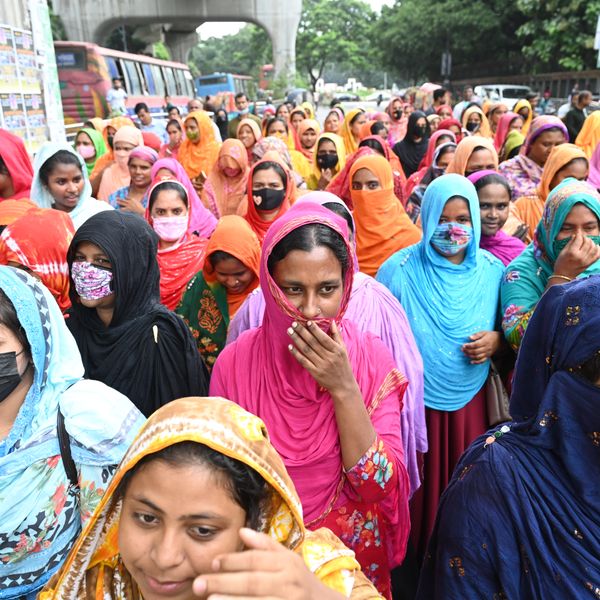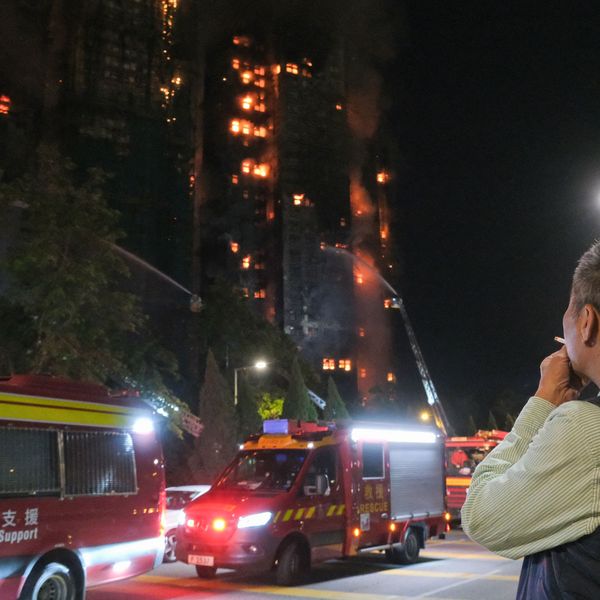Another Deadly Fire Hits Bangladeshi Garment Factory
In what has become an all-too-familiar news story, another deadly fire has broken out at a garment factory in Bangladesh on Tuesday.

Some fear the death toll could be much higher.
"It's a massive fire. Ten fire brigade teams are working to put it out," local police chief Amir Hossain told Agence France-Presse.
Mahbubur Rahman, the local fire service director, told AFP that it took an hour for emergency services to arrive because "There is no fire station within a 20-mile radius of the factory."
The low-paying, unsafe working conditions at garment factories in the country have received growing coverage since April when over 1,100 people died in a factory collapse, and recent protests by hundreds of thousands of workers have called for better pay and working conditions; however, day-to-day miserable conditions continue to affect those toiling for poverty wages in the $20-billion industry.
In These Times writer Michelle Chen noted recently:
Despite protests led by workers and solidarity campaigns by labor advocates around the globe, however, the multinational brands that drive Bangladesh's thriving garment industry are characteristically reluctant to address demands either for higher wages or fair compensation for aggrieved workers and their families. [...]
The rage that now pulses through the streets of Dhaka sends a powerful message to both consumers and corporate CEOs in the countries that profit from the drudgery of Bangladeshi workers. When a factory can turn into a death trap in an instant, they might as well turn the street into their battleground.
___________________
An Urgent Message From Our Co-Founder
Dear Common Dreams reader, The U.S. is on a fast track to authoritarianism like nothing I've ever seen. Meanwhile, corporate news outlets are utterly capitulating to Trump, twisting their coverage to avoid drawing his ire while lining up to stuff cash in his pockets. That's why I believe that Common Dreams is doing the best and most consequential reporting that we've ever done. Our small but mighty team is a progressive reporting powerhouse, covering the news every day that the corporate media never will. Our mission has always been simple: To inform. To inspire. And to ignite change for the common good. Now here's the key piece that I want all our readers to understand: None of this would be possible without your financial support. That's not just some fundraising cliche. It's the absolute and literal truth. We don't accept corporate advertising and never will. We don't have a paywall because we don't think people should be blocked from critical news based on their ability to pay. Everything we do is funded by the donations of readers like you. Will you donate now to help power the nonprofit, independent reporting of Common Dreams? Thank you for being a vital member of our community. Together, we can keep independent journalism alive when it’s needed most. - Craig Brown, Co-founder |
In what has become an all-too-familiar news story, another deadly fire has broken out at a garment factory in Bangladesh on Tuesday.

Some fear the death toll could be much higher.
"It's a massive fire. Ten fire brigade teams are working to put it out," local police chief Amir Hossain told Agence France-Presse.
Mahbubur Rahman, the local fire service director, told AFP that it took an hour for emergency services to arrive because "There is no fire station within a 20-mile radius of the factory."
The low-paying, unsafe working conditions at garment factories in the country have received growing coverage since April when over 1,100 people died in a factory collapse, and recent protests by hundreds of thousands of workers have called for better pay and working conditions; however, day-to-day miserable conditions continue to affect those toiling for poverty wages in the $20-billion industry.
In These Times writer Michelle Chen noted recently:
Despite protests led by workers and solidarity campaigns by labor advocates around the globe, however, the multinational brands that drive Bangladesh's thriving garment industry are characteristically reluctant to address demands either for higher wages or fair compensation for aggrieved workers and their families. [...]
The rage that now pulses through the streets of Dhaka sends a powerful message to both consumers and corporate CEOs in the countries that profit from the drudgery of Bangladeshi workers. When a factory can turn into a death trap in an instant, they might as well turn the street into their battleground.
___________________
In what has become an all-too-familiar news story, another deadly fire has broken out at a garment factory in Bangladesh on Tuesday.

Some fear the death toll could be much higher.
"It's a massive fire. Ten fire brigade teams are working to put it out," local police chief Amir Hossain told Agence France-Presse.
Mahbubur Rahman, the local fire service director, told AFP that it took an hour for emergency services to arrive because "There is no fire station within a 20-mile radius of the factory."
The low-paying, unsafe working conditions at garment factories in the country have received growing coverage since April when over 1,100 people died in a factory collapse, and recent protests by hundreds of thousands of workers have called for better pay and working conditions; however, day-to-day miserable conditions continue to affect those toiling for poverty wages in the $20-billion industry.
In These Times writer Michelle Chen noted recently:
Despite protests led by workers and solidarity campaigns by labor advocates around the globe, however, the multinational brands that drive Bangladesh's thriving garment industry are characteristically reluctant to address demands either for higher wages or fair compensation for aggrieved workers and their families. [...]
The rage that now pulses through the streets of Dhaka sends a powerful message to both consumers and corporate CEOs in the countries that profit from the drudgery of Bangladeshi workers. When a factory can turn into a death trap in an instant, they might as well turn the street into their battleground.
___________________

